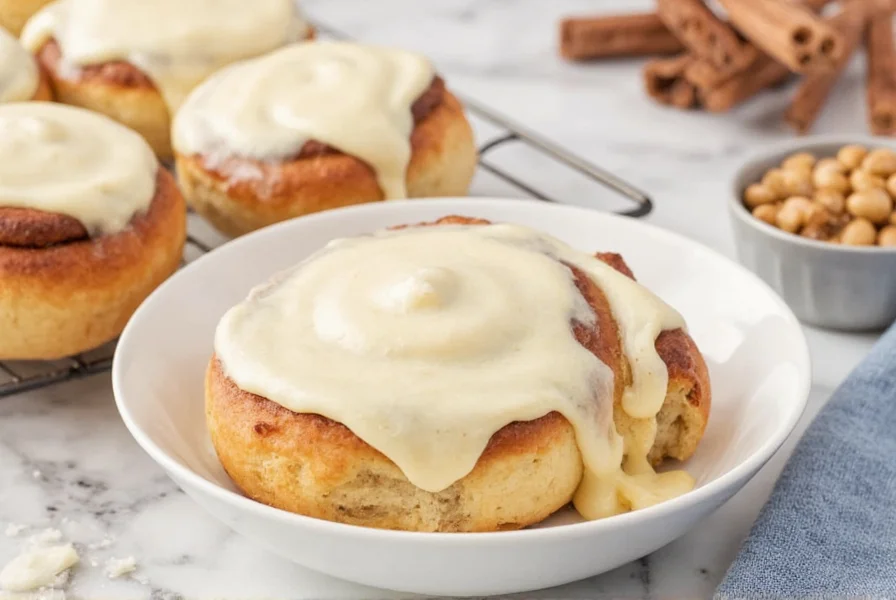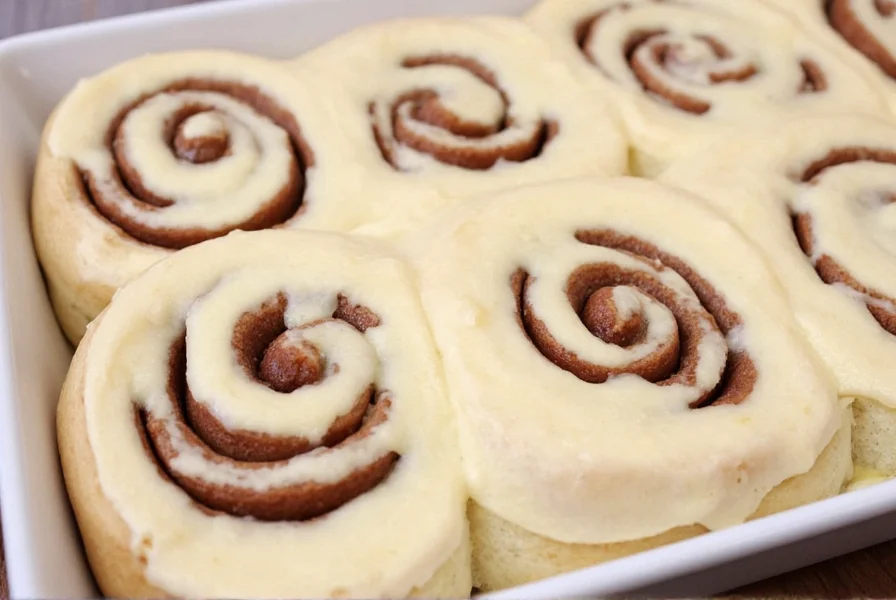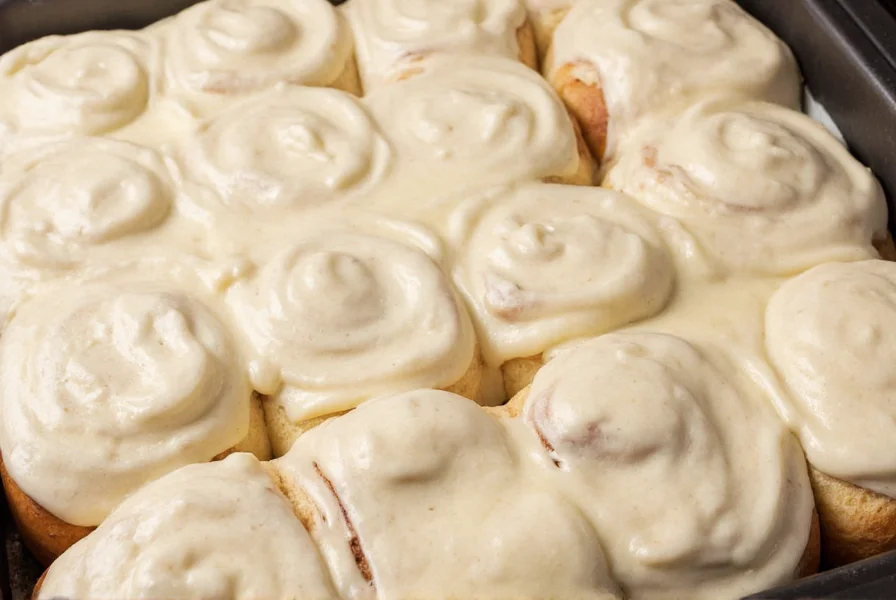Nothing compares to the aroma of freshly baked cinnamon rolls with cream cheese frosting filling a kitchen. These beloved pastries combine sweet, spiced dough with a creamy topping that transforms a simple breakfast into a special occasion. While many store-bought versions exist, homemade cinnamon rolls with cream cheese frosting offer superior texture and flavor complexity that commercial products can't match.
The Science Behind Perfect Cinnamon Roll Dough
Creating exceptional cinnamon rolls with cream cheese frosting starts with understanding dough chemistry. The ideal dough temperature during mixing should be between 75-80°F (24-27°C) to activate yeast properly without killing it. Too hot, and your yeast dies; too cold, and fermentation slows dramatically. Professional bakers use a simple calculation: for every 1°F increase in water temperature, dough temperature rises by approximately 2.5°F.
| Ingredient | Function in Cinnamon Rolls | Professional Tip |
|---|---|---|
| Active dry yeast | Creates air pockets for rise | Proof in 105-110°F liquid with pinch of sugar |
| Bread flour | Higher protein for structure | Substitute 25% cake flour for softer texture |
| Unsalted butter | Flakiness and flavor carrier | Use European-style (82% fat) for richer taste |
| Ceylon cinnamon | Primary flavor component | Toast lightly before using to intensify aroma |
Step-by-Step Guide to Homemade Cinnamon Rolls
Follow these professional techniques for cinnamon rolls with cream cheese frosting that rival bakery quality:
Dough Preparation
Combine 1 cup warm whole milk (105-110°F), 2 ¼ teaspoons active dry yeast, and 2 tablespoons granulated sugar in a small bowl. Let sit for 5-7 minutes until foamy. In a stand mixer with dough hook attachment, mix 4 cups bread flour, ⅓ cup granulated sugar, 1 teaspoon salt, and the yeast mixture. Gradually add ½ cup softened unsalted butter while mixing on medium speed. Knead for 8-10 minutes until smooth and elastic.
Filling Perfection
The secret to exceptional cinnamon rolls with cream cheese frosting starts with the filling. Combine 1 cup packed light brown sugar, 3 tablespoons Ceylon cinnamon, and 2 tablespoons all-purpose flour. After rolling your dough into a 16x20 inch rectangle, spread ½ cup softened butter evenly across the surface. Sprinkle the sugar-cinnamon mixture evenly, leaving a ½ inch border. Roll tightly from the long side, pinch seam to seal, and cut into 12 equal pieces using dental floss for clean slices.
Proofing for Optimal Texture
Place cut rolls in a greased 9x13 inch baking dish, cover loosely with plastic wrap, and let rise in a warm spot until doubled in size (60-90 minutes). The dough should spring back slowly when gently pressed. Rushing this step creates dense rolls, while over-proofing causes collapse during baking. Professional bakers maintain a consistent 80°F environment for ideal proofing.
Cream Cheese Frosting Mastery
While rolls bake at 350°F for 20-25 minutes until golden brown, prepare the frosting. Beat together 8 ounces softened cream cheese, 4 tablespoons softened butter, 1 teaspoon vanilla extract, and a pinch of salt until smooth. Gradually add 2 cups powdered sugar until desired consistency. For bakery-style cinnamon rolls with cream cheese frosting, add 1-2 tablespoons of heavy cream if needed to reach spreading consistency. Apply while rolls are still warm but not hot to prevent melting.
Common Mistakes That Ruin Cinnamon Rolls
Even experienced home bakers make these critical errors when preparing cinnamon rolls with cream cheese frosting:
- Incorrect yeast temperature - Water above 130°F kills yeast, while cold water prevents activation
- Over-flouring the work surface - Excess flour creates dry, tough rolls
- Cutting rolls with a knife - Use dental floss for clean slices without squishing
- Applying frosting to hot rolls - Wait until internal temperature reaches 140°F
- Using low-fat cream cheese - Full-fat provides proper texture and flavor
Storage and Reheating Techniques
Properly stored cinnamon rolls with cream cheese frosting maintain freshness for 3-4 days at room temperature. Place in an airtight container with parchment between layers. For longer storage, freeze unfrosted rolls for up to 3 months. Thaw overnight in the refrigerator, then bring to room temperature before baking. To refresh day-old rolls, microwave individual portions for 10-15 seconds covered with a damp paper towel.
Flavor Variations Worth Trying
While traditional cinnamon rolls with cream cheese frosting remain popular, these sophisticated variations elevate the classic:
- Bourbon-pecan - Add 2 tablespoons bourbon to the frosting and top with candied pecans
- Apple cinnamon - Layer thinly sliced apples between the dough and filling
- Orange-cardamom - Substitute orange zest and cardamom for some cinnamon
- Maple-bacon - Use maple sugar in the filling and top with crispy bacon bits

Why Homemade Beats Store-Bought Every Time
Commercial cinnamon rolls with cream cheese frosting often contain preservatives and stabilizers that compromise texture and flavor. Homemade versions allow control over ingredient quality, sweetness level, and spice intensity. The difference becomes especially apparent in the dough texture - properly made homemade rolls pull apart with a satisfying resistance, while many store-bought versions have an artificial, gummy consistency. When preparing cinnamon rolls with cream cheese frosting from scratch, you can also adjust the cinnamon-to-sugar ratio to match personal preference rather than accepting a standardized formula.

Perfect Pairings for Cinnamon Rolls
Cinnamon rolls with cream cheese frosting shine when served with complementary beverages. While coffee remains the classic pairing, consider these sophisticated combinations:
- Medium roast Colombian coffee - Balances sweetness with bright acidity
- Bourbon-spiked hot chocolate - Creates a decadent dessert experience
- Orange-ginger tea - Cuts through richness with citrus notes
- Cold brew with cinnamon stick - Enhances the spice profile naturally
Frequently Asked Questions
How do I prevent my cinnamon rolls from becoming dry?
Prevent dry cinnamon rolls by measuring flour correctly (spoon and level method), avoiding over-kneading, and not over-baking. The ideal internal temperature is 190°F. Using whole milk and full-fat butter in the dough also maintains moisture. Never refrigerate dough before baking - cold dough takes longer to bake, drying out the edges.
Why does my cream cheese frosting become runny?
Cream cheese frosting becomes runny when ingredients aren't properly chilled or when too much liquid is added. Always use full-fat cream cheese and butter at cool room temperature (65-70°F), not warm. If frosting is too thin, add more powdered sugar 1 tablespoon at a time. Never apply frosting to hot rolls - wait until internal temperature drops below 140°F.
Can I prepare cinnamon rolls with cream cheese frosting ahead of time?
Yes, prepare cinnamon rolls with cream cheese frosting up to two days ahead. After shaping, place rolls in baking dish, cover tightly, and refrigerate. On serving day, remove from refrigerator 2 hours before baking to allow proper proofing. For longer storage, freeze unbaked rolls for up to 3 months, then thaw overnight in refrigerator before baking.
What's the best type of cinnamon for cinnamon rolls?
Ceylon cinnamon (true cinnamon) provides the best flavor for cinnamon rolls with cream cheese frosting. It has a sweeter, more complex flavor with less bitterness than common Cassia cinnamon. For optimal results, toast Ceylon cinnamon sticks lightly before grinding, or toast pre-ground cinnamon in a dry pan for 30 seconds to intensify the aroma without burning.











 浙公网安备
33010002000092号
浙公网安备
33010002000092号 浙B2-20120091-4
浙B2-20120091-4